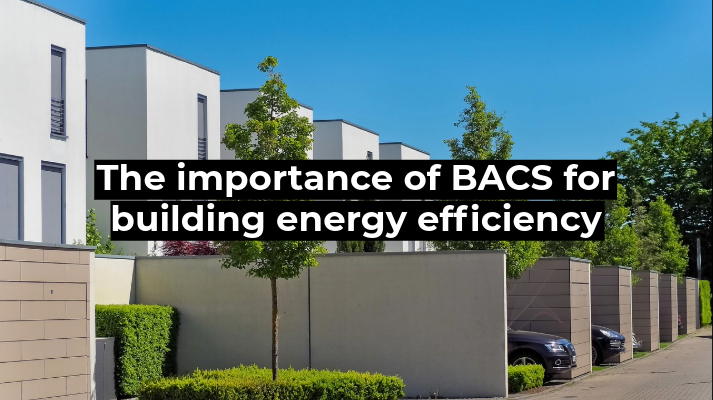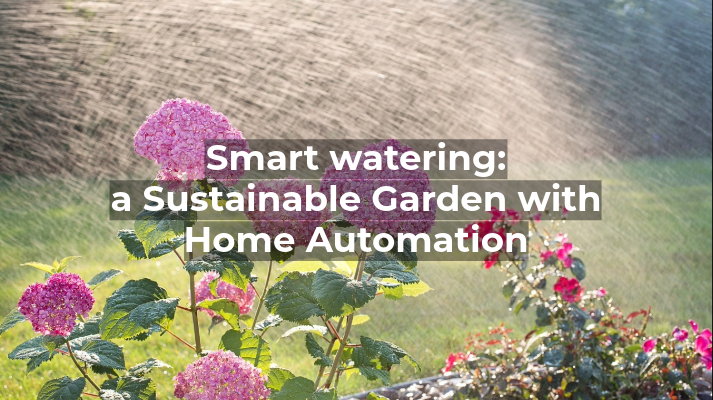BACS, which stands for Building Automation and Control Systems, are a set of integrated technologies and systems that allow for the monitoring, control, and automated management of all building systems, such as lighting, heating, ventilation, air conditioning, and other essential systems. BACS are primarily used to enhance energy efficiency and comfort within buildings. In this article, we will explore what Level B BACS are, their role in home automation, and why they are essential for meeting European standards and building a more sustainable future.
How do BACS work?
Class B BACS collect and process data related to energy consumption and efficiency, adjusting and optimizing the various building functions in real-time to improve efficiency, security, and comfort.
These systems can be applied in residential, commercial, or industrial settings and are essential in advanced home automation contexts, where systems must interact to create an efficient and sustainable environment. Their implementation is crucial not only for optimizing consumption but also for continuously monitoring and adapting the building’s performance based on various parameters, such as external temperature, space occupancy, and time-of-use periods..
The three classes of BACS
BACS are divided into three classes to define their control and automation capabilities, thus determining the efficiency and complexity of managing systems within a building:
- Class A: Full, advanced automation, maximum energy efficiency, for complex buildings.
- Class B: Intermediate automation, good energy efficiency, for medium-sized commercial buildings.
- Class C: Basic automation, low energy efficiency, for simple or small buildings.
This classification helps in selecting the right BACS system according to management needs and the complexity of the building.
If you would like to read more about the three classes of BACS (A, B and C), click here.
The importance of BACS in home automation
The main benefits of applying BACS in home automation are:
1. Preventive Maintenance and Diagnostics: BACS continuously monitor system status, allowing for early diagnosis of issues and reducing maintenance costs.
2. Energy Efficiency: BACS help reduce consumption by optimally and automatically regulating various systems that are activated or deactivated according to the building’s real needs (e.g., based on the presence of people in rooms or zones).
3. Environmental Sustainability: By reducing waste, BACS help decrease the environmental impact, contributing to energy sustainability goals.
4. Comfort and Safety: These systems make environments more comfortable and safe by automatically controlling temperature, lighting, and security based on preset parameters and sensors.
5. Centralization and Remote Control: With BACS, all building functions can be controlled from a single interface, even remotely via smartphones or tablets, thus improving the user experience.

BACS and the Directive on Green Houses (EU Energy Performance of Buildings Directive)
In the context of the EPBD (Energy Performance of Buildings Directive), also known as the Green Homes Directive, the adoption of BACS becomes crucial. The EPBD aims to improve building energy performance across the European Union by promoting a reduction in energy consumption and CO₂ emissions. Among its requirements is the implementation of advanced technologies for monitoring and managing building energy consumption, where BACS play a key role.
- Energy Monitoring and Control: With BACS, real-time energy consumption can be monitored, waste can be identified, and consumption can be adjusted automatically according to the building’s needs.
- Efficiency Optimization: With BACS, buildings can adjust their operations to environmental conditions, enhancing overall efficiency.
- Self-consumption Optimization: By detecting peaks in energy production from photovoltaic panels, BACS can ensure energy-intensive appliances are used during peak production hours or determine optimal times for electric vehicle charging.
- Emission Reduction: By optimizing energy use, BACS help reduce greenhouse gas emissions, aligning with the sustainability goals of the directive.
- Diagnostics and Preventive Maintenance: BACS allow for identifying malfunctions and inefficiencies, improving the longevity of systems and preventing breakdowns.

DO.Energy: Dovit’s solution for energy management
Dovit has developed the DO.Energy solution, a system designed for advanced energy monitoring and management that perfectly meets the EPBD requirements and market efficiency standards. DO.Energy allows building owners and managers to:
1. Multi-protocol Control: DO.Energy, integrated with the Dovit server, allows for connecting and controlling different market protocols through a single interface, improving synergy between the building’s systems.
2. Monitor Real-Time Consumption: DO.Energy provides an intuitive interface for monitoring electricity, thermal, and water consumption, offering a complete and up-to-date view of the building’s energy performance.
3. Manage Energy Resources: Through DO.Energy, energy-saving strategies can be set to automatically regulate energy use based on real-time data, such as space occupancy and external climate conditions.
4. Meet Regulatory Requirements: The DO.Energy solution is designed to meet the EPBD requirements, facilitating building certification and helping owners reach European energy standards.
5. Reduce Operational Costs: By optimizing system efficiency and reducing waste, DO.Energy helps lower energy costs, enhancing the building’s economic sustainability.
Conclusion
Implementing BACS has become a must for anyone who wants to ensure energy efficiency, sustainability, comfort and safety in their building. In response to the Green Homes Directive and the increasing focus on environmental sustainability, BACS is an essential tool for controlling and optimising energy resources. Solutions such as Dovit’s DO.Energy are an excellent example of how it is possible to respond to the challenges of European legislation while improving performance and property value.









